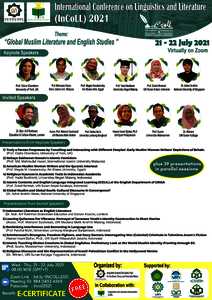Hasan, Md. Mahmudul (2021) Rokeya Sakhawat Hossain’s Islamic feminism. In: International Conference on Linguistics and Literature (InCoLL) 2021: Global Muslim Literature and English Studies, 21-22 July 2021, Virtual. (Unpublished)
![[img]](http://irep.iium.edu.my/90936/1.hassmallThumbnailVersion/conference%20flyer.jpeg)
|
PDF
Download (208kB) | Preview |
|
|
PDF
Download (502kB) | Preview |
|
|
PDF
Download (505kB) | Preview |
Abstract
A 2004 BBC Bangla Service survey on the greatest Bengali of all time put Rokeya Sakhawat Hossain (1880-1932) at number six. She was the only woman to make it in its list of top 20. Widely revered as a literary scholar, social reformer and social justice activist, Rokeya fought for women’s rights on multiple fronts – literary, political and educational. Although during her lifetime she faced opposition from many sectors, in today’s Bangladesh, her iconic status is evidenced in the fact that 9 December, which marks her birth and death anniversaries, is a national day. In her revolutionary pursuit to establish women’s rights, she critiqued cultural prejudices and pseudo-religious mythologies against women’s rights and equal educational opportunities. Unfortunately, some critics interpret her stance against pseudo-religious structures as one against Islam. They drive a wedge between Rokeya and her religion because of her atypical, unorthodox religious views and her challenge to its patriarchal construction. Confusing the Islamic dress code of hijab with the culturally-inflected Indian style purdah, and Rokeya’s revolutionary stance against it, is another reason for misunderstanding Rokeya’s religious standpoint. Moreover, isolated readings of some of Rokeya’s statements tend to define her as a secular feminist, as some see her arguments through the lens of Western feminism. Arguments of disaffiliation between Rokeya and Islam are compounded by an assumed binary relationship between Islam and feminism, as many regard the term ‘Islamic feminism’ as an oxymoron. This study attempts to challenge some of these notions and show that Islam is at the centre of Rokeya’s feminist arguments, and that she takes Islam, not secular western feminist ideals, as the framework for her struggle. Like latter-day Islamic feminists, Rokeya made a comeback call to the Muslims of Bengal to adhere to Islamic teachings and to emulate the life of the Prophet Muhammad in order to ensure gender justice in its broadest sense. Rokeya’s Islamic feminism does not fault Islam for gender oppression rather shows that the religion ensures gender justice.
| Item Type: | Proceeding Paper (Keynote) |
|---|---|
| Uncontrolled Keywords: | Rokeya Sakhawat Hossain, Islamic feminism, gender justice, cultural prejudices against women, pseudo-religious mythologies |
| Subjects: | P Language and Literature > PI Oriental languages and literatures P Language and Literature > PK Indo-Iranian P Language and Literature > PN Literature (General) > PN0080 Criticism |
| Kulliyyahs/Centres/Divisions/Institutes (Can select more than one option. Press CONTROL button): | Kulliyyah of Islamic Revealed Knowledge and Human Sciences Kulliyyah of Islamic Revealed Knowledge and Human Sciences > Department of English Language & Literature |
| Depositing User: | Dr. Md. Mahmudul Hasan |
| Date Deposited: | 23 Jul 2021 08:49 |
| Last Modified: | 23 Jul 2021 16:00 |
| URI: | http://irep.iium.edu.my/id/eprint/90936 |
Actions (login required)
 |
View Item |


 Download Statistics
Download Statistics Download Statistics
Download Statistics